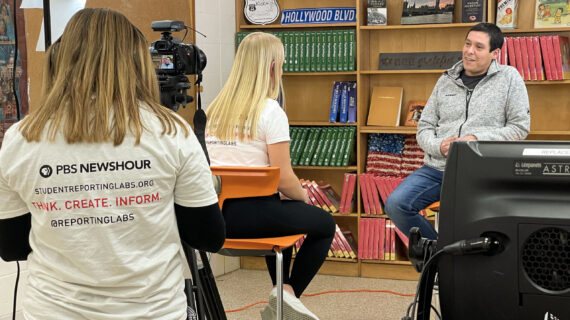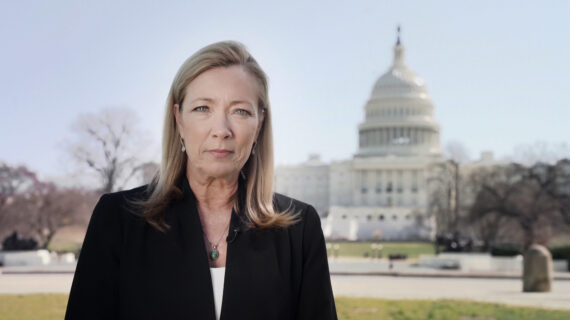Zac Schultz:
In our first look tonight, a team of UW Law School students will travel next month to Texas to provide legal services to immigrants facing deportation. Erin Barbato is an immigration attorney and a clinical instructor at the UW Law School and will lead the students. Thanks for joining us today.
Erin Barbato:
Thank you for having me and thank you for your interest.
Zac Schultz:
Who will you be representing exactly? You’ve heard a lot about different groups of people, children, families, adults.
Erin Barbato:
So we’ll be heading to a town, the town of Dilly, where there is a family residential facility there that currently houses about 2,000 people. We’ll be representing people who are detained there in certain immigration proceedings.
Zac Schultz:
And are these the separated children that everyone’s heard the most about or is this a separate situation?
Erin Barbato:
Right now, the south Texas family residential center where we will be going, they house families. So it’s mostly mothers and their children who are housed there.
Zac Schultz:
What kinds of services are you going to be providing?
Erin Barbato:
What we’re hoping to do is often we will be representing individuals and helping them prepare for a thing called a credible fear interview as well as alternatives to detention. So helping some families apply for bond. And if they can post the bond, then they can be released from the facility in order to continue the process of applying for release from deportation and often that’s asylum.
Zac Schultz:
Are all these people seeking asylum?
Erin Barbato:
I wouldn’t say all of them but a good majority of them are.
Zac Schultz:
We heard a lot of the stories of people that are coming from Central and South America escaping gang violence and other issues. Is that what you’re expecting to find?
Erin Barbato:
Correct. Yes. So a lot of the individuals are coming from the northern triangle of El Salvador, Guatemala and Honduras. And they’ve made the trek through Mexico to get to the border of the United States. And then once they arrive, they’re placed in these facilities. And as of now they’re not separated from their children, but housed in detention together. And then from there they start their journey through the immigration process.
Zac Schultz:
And what would happen if they didn’t have representation?
Erin Barbato:
As many people know, and not everybody knows, our government doesn’t provide representation, legal representation in immigration proceedings because it’s considered a civil proceeding. So if attorneys aren’t there, then the individuals are representing themselves in front of an immigration judge and immigration officers without legal representation. And studies have shown that if you’re in detention, you’re twice as likely to be successful in an immigration proceeding if you’re represented by an attorney.
Zac Schultz:
So for these students, are they going there for work experience or is this part of social justice for them?
Erin Barbato:
I think it’s both. I mean they are very passionate. They’re very concerned about what is going on in our country right now in terms of immigration. So it’s kind of dual-fold. It gives them an opportunity to be on the ground and helping people immediately, but also growing their skills as immigration attorneys and just attorneys in general and being able to bring those skills back to Wisconsin, where we have a need for these services as well.
Zac Schultz:
And will you be following these cases all the way through completion or is this just a temporary thing?
Erin Barbato:
The way that the program is set up, it’s set up through the CARA pro bono project and it’s basically set up so people can come down there for a week and represent. It’s a training for one week. So they get trained on Sunday and then every other day of the week we’re doing services, whatever’s needed down there. After then after that we’re not necessarily taking the cases with us home, but the next group that comes in will continue with that representation. Some of them we may, depending on what goes on. We may be able to continue with them, but we don’t know at this point.
Zac Schultz:
Governor Walker has refused to comment on the family separation policy saying it’s a federal issue and not related to Wisconsin. Do you agree with him? Or is all of this connected?
Erin Barbato:
No. I think the — separating families, children from their parents, I don’t know how any human being can agree with that. It’s not a policy that our country should ever support. And so his inability to respond I think is a huge message about where he stands.
Zac Schultz:
But you also do immigration services in Wisconsin.
Erin Barbato:
Correct.
Zac Schultz:
It’s not just the border that has these kind of issues.
Erin Barbato:
No. Wisconsin, we have a lot of need, especially here in Dane County, where we don’t have a lot of pro bono services available for people in removal proceedings, especially people that are detained. They can’t afford to pay a private attorney to represent them because they’re unable to work while they’re in detention. So we’re working towards providing more services to individuals in Dane County and raising funding so that eventually we can have universal representation for every resident of Dane County placed in removal proceedings, especially children.
Zac Schultz:
Now, a lot of the attention has been driven to the border based on the separation policy. Was this planned before all that came to light?
Erin Barbato:
It was. So students have been going down since 2014, when the initial residential facilities were built. And we did go down at that point, too. So the students of the Immigrant Justice Clinic and the Latino/Latina Law Student Association at the UW Law School planned this trip prior to the families being separated. So they were interested in going down and using their services down there prior to this policy which has now ended. But families are still being detained.
Zac Schultz:
So what has the additional spotlight meant for this program in terms of attention and maybe dollars too?
Erin Barbato:
Well, as of now, we’re not sure. I mean people are really interested to learn with what’s going on with the students going down there to help at the border, but I think what it’s given is an opportunity for people to understand the crises that we have in Wisconsin, being that there are a lot of people here who are without representation. And the need of Dane County being one of — or Madison being voted one of the kindest cities in the country, I think we are all motivated to continue to build funding to provide these services to people in removal proceedings.
Zac Schultz:
Is there a danger of the partisan polarization making it more difficult to navigate just in terms of service to people as opposed to becoming a political issue?
Erin Barbato:
I think right now everyone is understanding that immigration is — people in immigration proceedings and everyone who’s an immigrant is facing fear and policies that are affecting their families, our neighbors, our co-workers. So right now it just seems like everybody wants to help in some way.
Zac Schultz:
All right. Erin Barbato, thank you for your time today.
Erin Barbato:
Thank you so much for having me.
Search Episodes
Related Stories from PBS Wisconsin's Blog

Donate to sign up. Activate and sign in to Passport. It's that easy to help PBS Wisconsin serve your community through media that educates, inspires, and entertains.
Make your membership gift today
Only for new users: Activate Passport using your code or email address
Already a member?
Look up my account
Need some help? Go to FAQ or visit PBS Passport Help
Need help accessing PBS Wisconsin anywhere?

Online Access | Platform & Device Access | Cable or Satellite Access | Over-The-Air Access
Visit Access Guide
Need help accessing PBS Wisconsin anywhere?

Visit Our
Live TV Access Guide
Online AccessPlatform & Device Access
Cable or Satellite Access
Over-The-Air Access
Visit Access Guide
 Passport
Passport










Follow Us